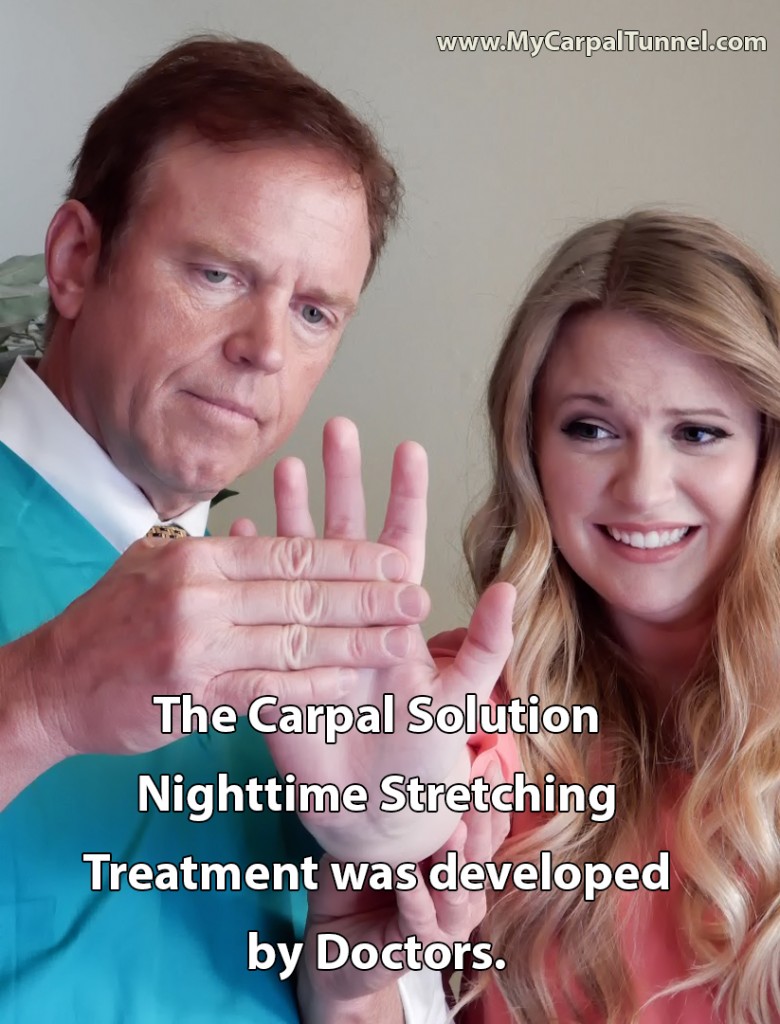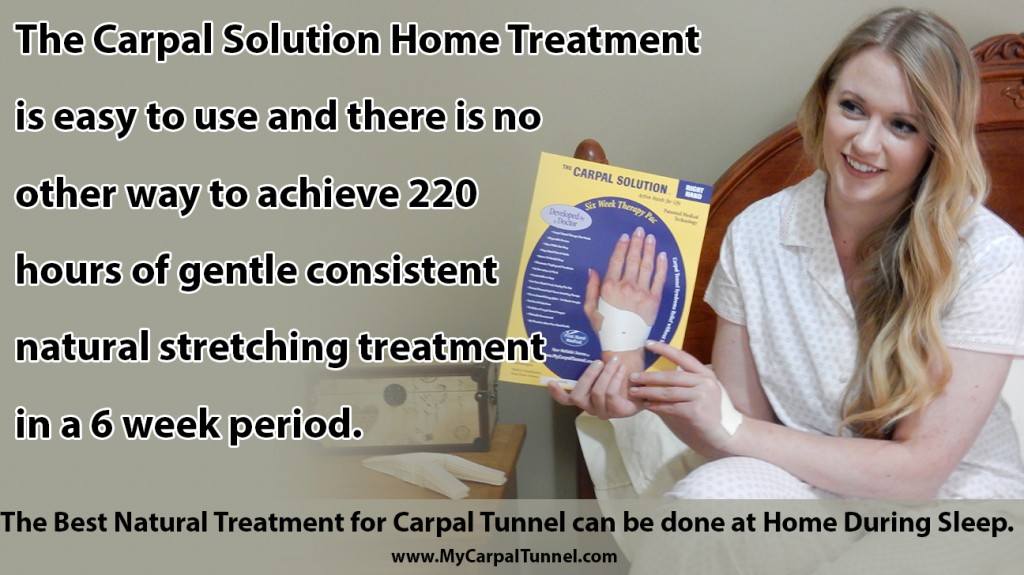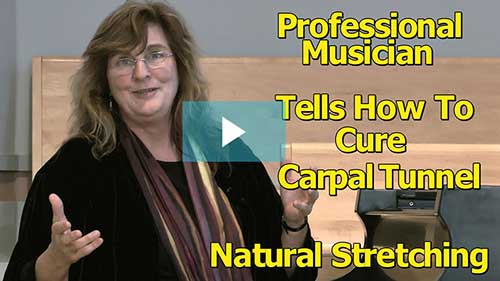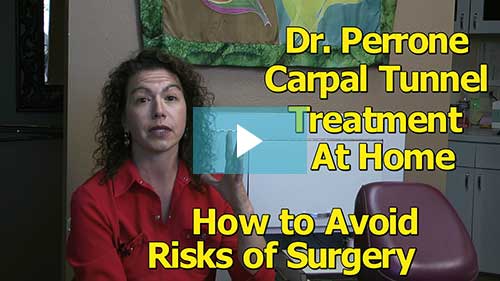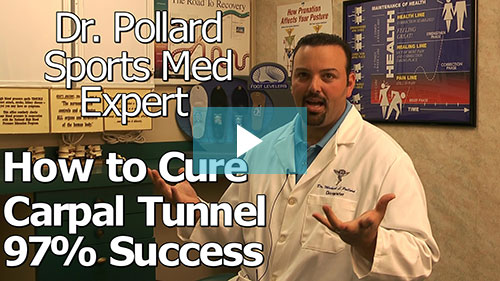Natural Carpal Tunnel Treatment – Less Medicine More Health
Article Authored by Doctor Jerome H. Grossman, MD
Co-Founder of First Hand Medical and Former Director of Harvard’s Kennedy School Health Care Delivery Policy Program
https://www.mycarpaltunnel.com/medical-experts/doctor-jerome-h-grossman-md/
It is human nature to try to aggressively treat any malady with the maximum force of treatment options. However, by following human nature, many areas of medicine are providing “too much medicine” that in many cases actually causes more harm than good for the patient.
This is a contrarian concept that has been put forward by a leader in the study and research of Health Policy and Clinical Practice, Dr. H. Gilbert Welch. Dr. Welch was an Internist at the Veterans Administration Medical Center in White River Junction, Vermont for many years and was a Professor of Medicine at Dartmouth Institute for Health Policy and Clinical Practice for over a decade.
Dr. Welch Authored a book addressing the subject in detail called: Less Medicine More Health
He also wrote another book called: Over-Diagnosed: Making People Sick in the Pursuit of Health
Like many areas of medicine, the diagnosis and treatment of Carpal Tunnel Syndrome fall into the negative cycle of:
“Too much medicine being applied for worse health outcomes.”
Dr. Gilbert was one of the first to established the case that too much medical care could be a problem, not just because it is so expensive, but because it can result in adverse effects for the patient. It’s not to deny that some people get too little medical care, rather, it’s that the conventional concern about “too little medical treatment” needs to be balanced with a concern about “too much”: Too many people are being tested and exposed to the harmful effects of the testing process; too many people being subjected to treatments they don’t need—or can’t benefit from or that have too many side effects or risks.
The American public has been sold the idea that seeking medical care is one of the most important steps to maintain wellness. Surprisingly, medical care is not, in fact, well correlated with good health. So, more medicine does not necessarily equal more health; in reality the opposite may be true.
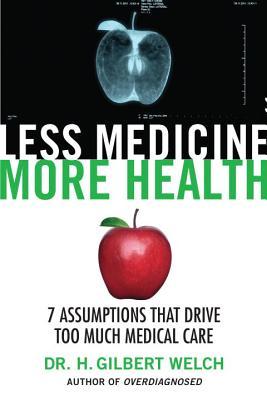
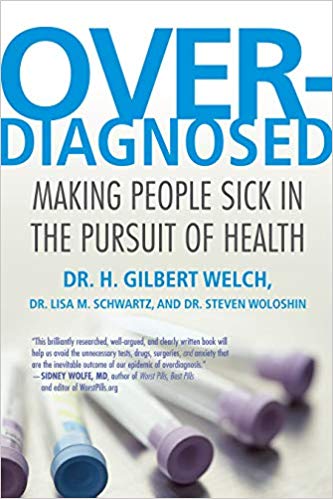
A complex web of factors has created the phenomenon of over-diagnosis: the popular media promotes fear of disease and perpetuates the myth that early, aggressive treatment is always best; in an attempt to avoid lawsuits, doctors have begun to leave no test undone, no abnormality overlooked; and profits are being made from screenings, medical procedures, and pharmaceuticals. Revealing the social, medical, and economic ramifications of a health-care system that over-diagnoses and over-treats patients, Dr. H. Gilbert Welch makes a reasoned call for change that would save us pain, worry, and money.
Such testing of healthy individuals all too often results in over-diagnosis and over-treatment, because in reality there is “nothing to fix.” As a result, contend the authors, although a few will be helped, many will be over-diagnosed, and some will be harmed.
Examples of too much Medicine for Worse Outcomes with Carpal Tunnel Treatment:
Example 1 – Wrist Splints and Oral Pain Medication
A common treatment option offered to patients with Carpal Tunnel Pain on their first Doctor visit is to prescribe a wrist splint and oral pain medication. The reality is that neither of these treatment options is effective in the treatment of Carpal Tunnel.
Wrist Splints sometimes relieve some discomfort from movement at first, but in the long run lead to muscle atrophy and further injury to the soft tissue caused by a rigid piece of fiberglass or metal pressing consistently against the soft tissue in the hand and on the forearm. In the long run patients report that their symptoms get worse with wearing wrist splints and rigid hand braces.
Oral Pain Medical has little effect on Carpal Tunnel because blood circulation to the injured tissue is blocked by the trapped inflammation and trapped lymphatic fluid that are putting pressure on the Median Nerve in the Carpal Tunnel. If the actives to not reach the injured tissue they have little effect in relieving pain. Also, there are way too many side effects and dependency issues associated with using oral pain medication of any kind to treat a chronic condition like Carpal Tunnel Syndrome. It is just not worth the risks for minimal pain relief from these pain medications. Side effects can seriously threaten vital organs like kidney function, also, brain, liver and pancreatic function. Why put key organs at risks for short term pain relief that does not contribute to a long-term solution to the problem of pressure on the Median Nerve in the Carpal Tunnel.
Example 2 – Steroid Injections
Steroid Injections are often applied in the second visit after the wrist splints and oral pain medication did not help. Steroid Injections have been documented to provide effective relief from Carpal Tunnel Symptoms for 55 to 60% of patients for a few months. These steroid treatments are not a long term answer for most people. When they do work, they only relieve symptoms for 2 – 3 months for the average patient.
The bigger question is do steroids have any risks or problems to which a patient should be wary of exposing themselves. Most patients generally have a natural wariness towards steroid treatment. The negative long-term consequences of steroid use by athletes in professional or Olympic sporting events have been well documented. In fact Cortico-Steroids have been well documented to cause a loss of cartilage in joints even after one application both in animal studies and in Human studies.
Again, why would anyone submit themselves to the long-term risk of Cartilage loss for short-term pain relief from Carpal Tunnel Symptoms?
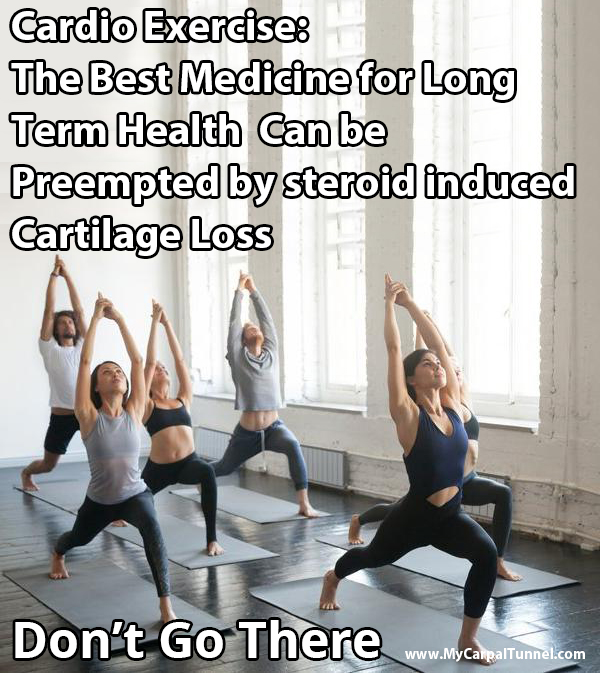
Cartilage is the glue that holds together our bones and is the lubricant that allows free movement of joints without pain. Once Cartilage is gone from our knees or elbows, or wrists, bone on bone movement will cause excruciating pain, limiting movement and virtually preempting natures best medicine:
Daily Cardiovascular Exercise.
Example 3 – Carpal Tunnel Surgery
After wrist splints, Oral Pain medication and Steroid Injections have failed to provide long-term relief from Carpal Tunnel Pain and Sleep Loss, a patients symptoms get worse. Doctors then send you to a neurologist for a Nerve Test and to a Surgeon to set up a Carpal Tunnel Release Surgical Procedure. The nerve test can be painful, but is required by Health Insurers before they will allow a surgical procedure to be paid for.
Carpal Tunnel Surgery has about a 50% to 60% success rate based on patient surveys. There is anywhere from 3 weeks to 12 weeks of downtime due to Carpal Tunnel Surgery and a host of potential complications ranging from permanent loss of grip strength to permanent tenderness at the point of incision. About 7% of people say their Carpal Tunnel Symptoms get worse after surgery. It can be a very frustrating and time-consuming process with many rehabilitation visits and oral pain medication to deal with post-operational pain. In the end, when surgery works, the symptoms of Carpal Tunnel can go away for up to 10 years.
However, many patient who believed Carpal Tunnel Surgery was a permanent fix are distressed and unsettled when their Carpal Tunnel Symptoms return even after surgery. In fact, Carpal Tunnel Symptoms reoccur for 90% of patients within 1 to 10 years after surgery even when “surgery was successful”.
The bad news is, second surgeries have only a 40% success rate based on patient surveys. This is due to the formation of scar tissue from the first surgical procedure.
Third surgeries for Carpal Tunnel Pain are strongly discouraged by Medical School Experts due to the potential for complications due to scar tissue built up from the previous two surgical procedures. Also, when the risk associated with any surgical procedure and its trauma are considered, for a relative short-term benefit. Surgery is a poor choice for the treatment of a syndrome caused by trapped inflammation and trapped lymphatic fluid.
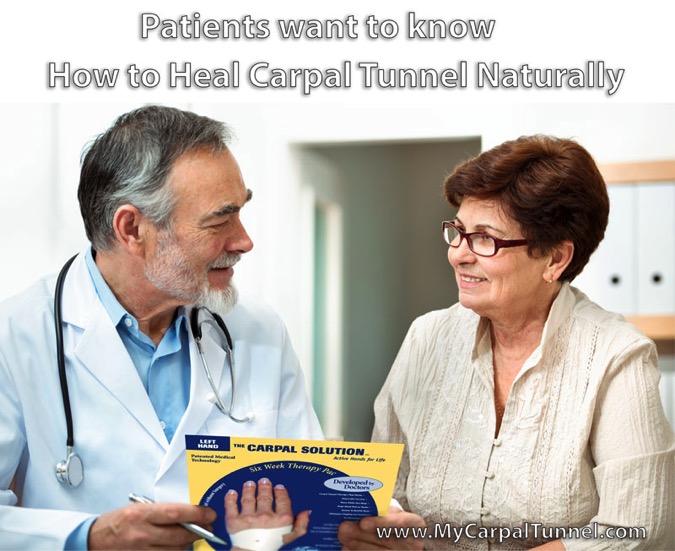
Excerpted from book: Overdiagnosed
“As I’ve noted, the conventional wisdom is that more diagnosis—particularly, more early diagnosis—means better medical care. The logic goes something like this: more diagnosis means more treatment, and more treatment means better health. This may be true for some. But there is another side to the story. More diagnosis may make healthy people feel more vulnerable—and, ironically, less healthy. In other words, excessive diagnosis can literally make you feel sick. And more diagnosis leads to excessive treatment—treatment for problems that either aren’t that bothersome or aren’t bothersome at all. Excessive treatment, of course, can really hurt you. Excessive diagnosis may lead to treatment that is worse than the disease.”
“All three of us (authors) are academic physicians: we see patients, we teach students, and we do research. But we are also people, and therefore potential patients. As people, we are concerned about the relentless expansion of the medical profession and the subsequent drive to turn people into patients. It is the melding of these two viewpoints—medical and personal—that provides the motivation for this book.”
Over-diagnosed Excerpt – New York Times Article – January 24, 2011
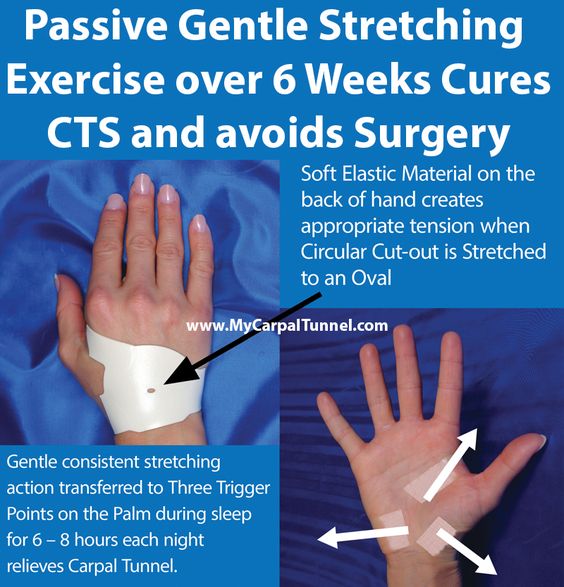
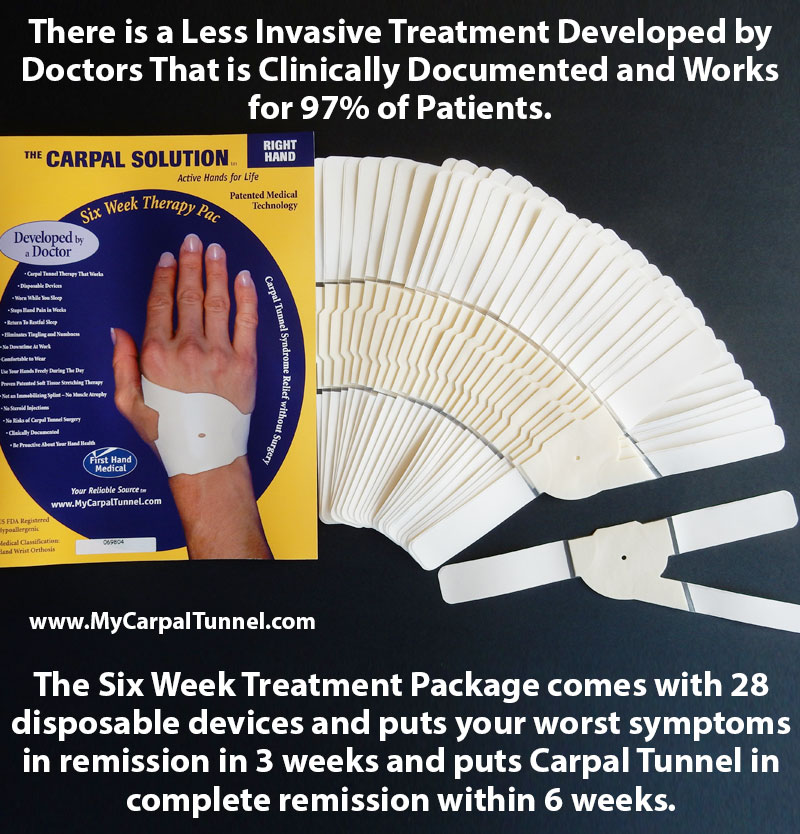
There is a better way to treat Carpal Tunnel Syndrome.
The adage “Less is More” applies in the case of Carpal Tunnel Treatment.
